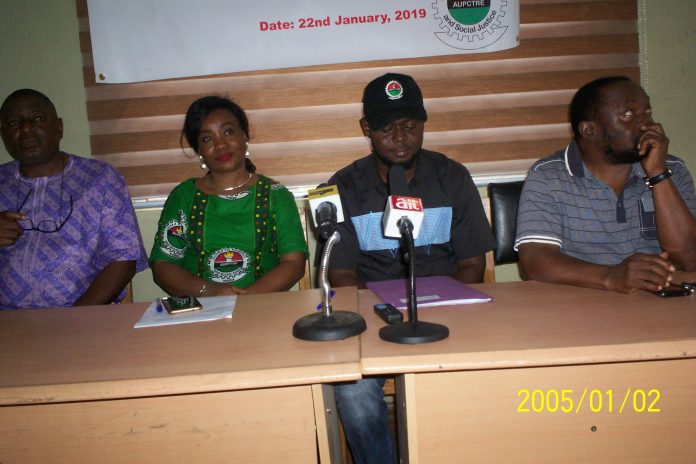.Accuses govt of corruption, mismanagement
By Daniel Kanu
Assistant Politics Editor
The Amalgamated Union of Public Corporations, Civil Service Technical and Recreational Service Employees (AUPCTRE) has revealed that the recent disruptions in public water supply by the Lagos Water Corporations (LWC) was a strategy by Lagos State government to deceive Lagosians into believing that the much-discredited privatization model of Public Private Partnership (PPP) was the solution to make the water sector work.
Also AUPCTRE, the biggest union under the Labour Union Organization, raised the alarm on the massive corruption going on in the sector, exposing the conduit pipe through which monies were siphoned.
At a press briefing in Lagos, Tuesday, January 22, 2019, Lagos State Secretary, AUPCTRE, Comrade Abiodun Bakare, among other speakers including: Comrade Akinbode Oluwafemi, Comrade Ayodele Akele, and Comrade Isimeme Eboh warned the Lagos State Governor, Akinwumi Ambode, to stop all clandestine moves to privatize water before the expiration of his tenure, May, 29, 2019.
There have been reports of water disruptions and shortages in many parts of Lagos especially in Bariga, Lawanson, Ojodu, Okota, Ketu, Agege, Abule Egba, Agboyi and Mile 12 among other areas.
AUPCTRE, via Bakare, stated: “We are compelled to inform you (Lagosians) that the current situation in water decline is a deliberate strategy by the management of the Lagos Water Corporation to cajole Lagosians into believing that the only sustainable way of supplying water to Lagos residents is to adopt the much-discredited privatization model of Public Private Partnership (PPP).
“It is disheartening to state here that, at this critical period when countries throughout the world are embracing remunicipalisation, Lagos State is spear-heading privatization.
“Its private arm, the International Finance Corporation (IFC), earlier this month also issued a statement on the first step of a partnership with Lagos which we believe includes water, though they deliberately did not mention it due to our opposition since 2014. The IFC has been at the fore-front of the promotion of the PPP model in the water sector.
“While the workers have welcomed reforms to make the LWC more productive, the management of the corporation which initiated the reforms is actually determined to ensure that the same reforms yield no positive result to pave the way for their privatization agenda which they desire despite popular resistance”.
While accusing government of its catalogue of corruption, AUPCTRE demanded a probe of all monies allocated to increase water supply in the state, especially monies channeled through the LWC since 2016.
It urged the incoming administration in Lagos to review all the dealings of the LWC with the IFC and other bodies calculated at handling Lagos water to privatizers and harness genuine inputs from well-meaning Lagos citizens that will ensure the human right to water is guaranteed.
Besides,
AUPCTRE revealed that “the sum of N24 million (twenty-four million naira) was released by the management for cutting of overgrown weeds in Iju.
“That the office of the Managing Director, Engr. Mumuni Badmus, was recently renovated at the cost of N70 million (Seventy million naira).
“That the much-celebrated N800 million (Eight hundred million naira), released by the state government for the rehabilitation of 48 mini and macro water works was diverted, leaving the said water works in even worse state.
“That LWC introduced a new six-month billing system which lasted till December 2018 whereby billing information gathered from consumers here in Nigeria are sent to a Ugandan company, TraceCorps Solution, which is a subsidiary of 2ML Consulting Limited for processing. The details are subsequently sent back to Nigeria for implementation. The project cost LWC $350,000 (about N110 million)”.













